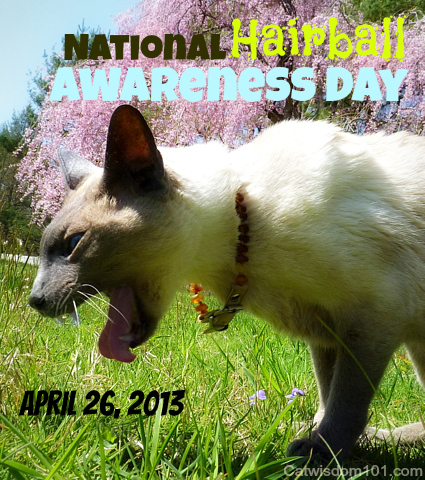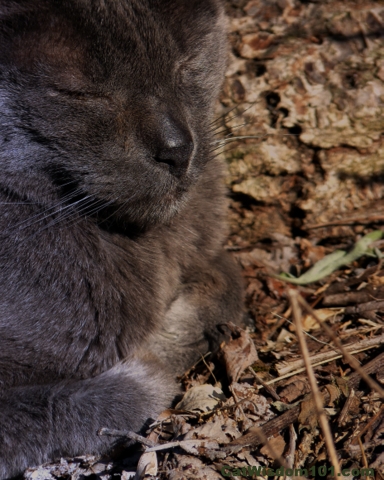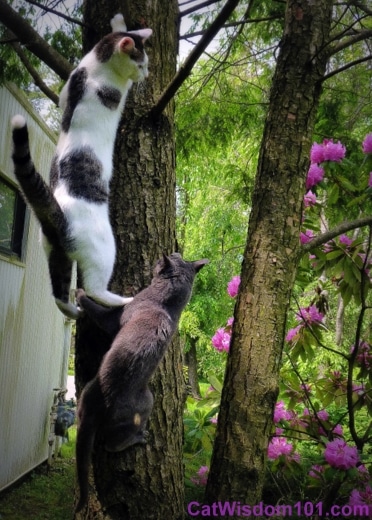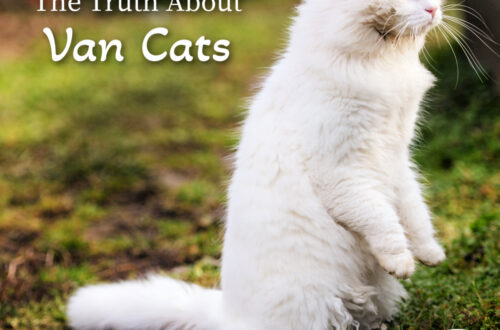
Vet 101: Hairballs in Cats
This week’s Vet 101 reader question is tackled by veterinarian Dr. Lerisa Miller. If you have a question about your cat kindly send it to info@catwisdom101.com with Vet 101 in the subject line. National Hairball Awareness Day is tomorrow and our Merlin is our poster boy. He rarely has hairballs but was about to regurgitate after eating grass in this dramatic photo.

Answer:The sounds of a cat retching can definitely be alarming, but as long as the vomiting isn’t happening often, it is probably not anything to be worried about. Cats get hairballs when they ingest hair while they groom their coats and the hair gets stuck in the stomach for some reason.
Sometimes when cats shed excessively or have a large amount of undercoat, large amounts of hair can enter the stomach and cause hairball formation. In these cases, daily combing is important. For a normal, semi-long-hair cat, combing two to three times weekly should be sufficient. Combing is much better than brushing at removing excess hair from cats’ coats. Brushes tend to slick over the top and don’t remove much undercoat. Medium-tooth combs can more easily reach the skin and lift out the loose hair.
While little peer reviewed literature has been published about hairballs, the feline veterinary community has become much more aware of the implications of frequent hairballs. In general, a hairball or two per year shouldn’t be cause for alarm, particularly in long-hair cats that are more likely to have hair mat together in the stomach before it has a chance to pass into the intestine. But when hairballs are more frequent, this may be cause for concern.
When hairballs start occurring more often, this can be a sign of delayed stomach emptying, the result of compromised stomach or intestinal motility. By far the most common cause of delayed stomach emptying and/or decreased intestinal motility is chronic inflammation in the gastrointestinal tract.
What causes chronic intestinal inflammation in cats? In my experience, dietary sensitivities seem to be the most common cause. When the diet is changed to one that is low in allergens, hairballs and other vomiting usually stop within a few weeks.
Other reasons for frequent vomiting include chronic pancreatitis, gall bladder and liver inflammation and, in middle-age to older cats, lymphoma of the gastrointestinal tract.
Hairballs can be alarming and are most assuredly annoying, particularly when you step on them in the middle of the night (yuck!). As long as they are infrequent, they shouldn’t cause much worry. Comb your long-hair cat at least two times a week (daily if it has persian-type hair) to keep hair ingestion to a minimum and feed a high-quality, low-allergen diet, and those unpleasant surprises on the floor will be kept to a minimum.





11 Comments
Pingback:
Beverly
Is a hairball a different item from regular regurgitation of food? I think that if you can still recognize it as food, then it was regurgitated. A hairball has hair all through it. In the discussion, it sounds like people are saying that it is all the same thing — related to what type of food they are eating. I have tried all kinds and my cat still throws up frequently after eating.
Layla Morgan Wilde
Beverly, yes they are not the same.
CATachresis
Hairballs are very rare here! But Austin insists on a brush every day! He does have a cough sometimes though! Didn’t realise combing was better! Thanks for the informative post!! x
Cynthia Southern
Why is it always when my cats gack up hairballs I step on them when I am half asleep? 🙂
Layla Morgan Wilde
To keep you on your toes 😉
Skeeter and Izzy
The diet thing strikes home here. When I got Izzy it was eat and within 15 minutes vomit. We finally identified the problem foods and I put her on a very good grain free food and no more vomiting unless she manages to steal a little too much of Skeeter’s food. We have infrequent hairballs except when Skeeter eats a mouse then it is a combo of mouse hair and other “parts”. Luvs Skeeter and Izzy >^..^<
Abby
We feel very fortunate that not too many hairballs in our house.
Good article.
Brian
Well those things are no fun regardless of the reason!
Kathryn
Wow, I just had a thought. Since we put our boys on the expensive prescription vet food because Cheddar had struvite crystals = no hairballs.
Emma Peel, long ago, had hairballs frequently, and vomited about twice weekly. However, she had been given hexachloraphene, before her rescue, and we figure that that was likely the reason. Oil in her diet helped the hairballs to come up. She lived to be 20.
Layla Morgan Wilde
That’s interesting about the change in diet. I find EFAs help.